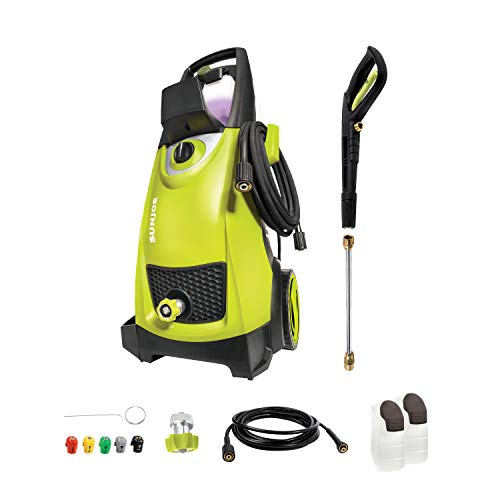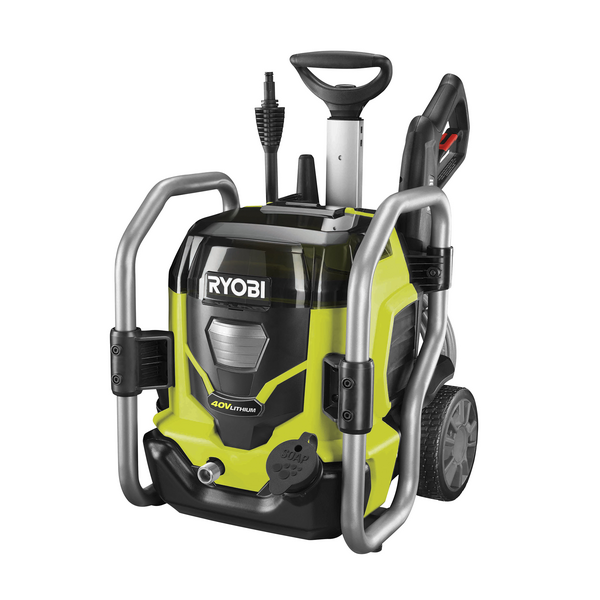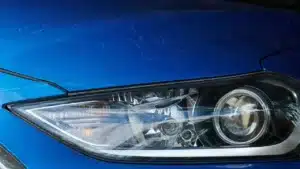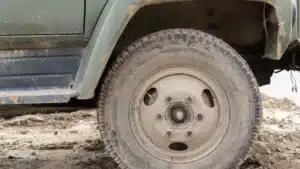The rising demand for electric pressure washers from the automotive industry has bolstered the growth of the global pressure washer market. Choosing the best electric pressure washer for cars from the host of electric-powered washers on the market can be overwhelming.
This is why we’ve gone through the stress of testing several electric pressure washers to compile a list of the best pressure washers for car washing. Karcher’s K5 Premium electric pressure washer is the best pressure washer we’ve found. The lightweight washer will conveniently wash your vehicle and can handle just about any cleaning task.
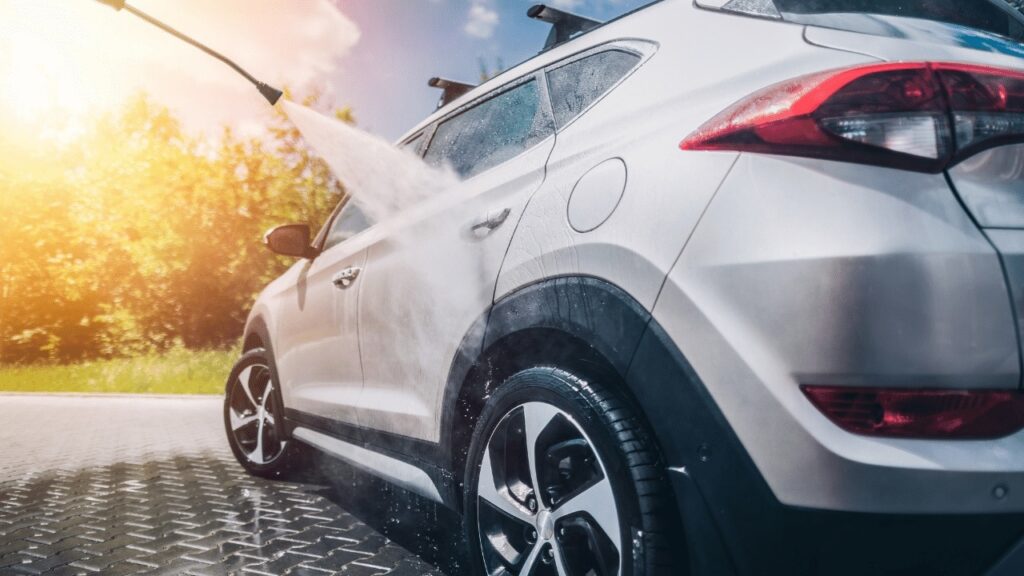
The Best Electric Pressure Washers For Cars
- Karcher K5 Premium 2000 PSI 1.4 GPM Electric Pressure Washer (Best overall)
- Sun Joe SPX3000 2030 Max PSI 1.76 GPM (Runner Up)
- Ryobi 1900 PSI Electric Pressure Washer RY1419MTVNM (Best Compact)
- Ryobi 1500 PSI 1.2 GPM Cordless Cold Water Electric Pressure Washer Model (Best Cordless)
- Greenworks GPW2000-1RG (Also Great)
- Greenworks Pro 3000-PSI Pressure Washer (Versatile Pressure Washer)
Karcher K5 Premium 2000 PSI 1.4 GPM Electric Pressure Washer
- PSI: Up to 2000 PSI
- GPM: 1.4
- Hose length: 25 feet kink resistant
- Power cord length: 35 feet
- Weight: 32 pounds
- Dimensions: 34.33 x 13.07 x 16.77 inches
- Power source: Wall outlet
- Warranty: 2 years
Sun Joe SPX3000 2030 Max PSI 1.76 GPM
- PSI: Up to 2030 PSI
- GPM: 1.76
- Hose length: 20 feet
- Power cord length: 35 feet
- Weight: 24.3 pounds
- Dimensions: 15.6 x 13.5 x 33.9 inches
- Power source: Wall outlet
- Warranty: 2 years
Ryobi 1900 PSI Electric Pressure Washer
- PSI: 1900 PSI
- GPM: 1.2
- Hose length: 25 feet
- Power cord length: 35 feet
- Weight: 25 pounds
- Dimensions: 22 x 13 x 14 inches
- Power source: Wall outlet
- Warranty: 3 years
Ryobi 1500 Max PSI 1.2 GPM Cordless Cold Water Electric Pressure Washer
- PSI: Up to 1500 PSI
- GPM: 1.2
- Hose length: 30 feet
- Power cord length: N/A
- Weight: 32 pounds
- Dimensions: 23 x 14.5 x 16 inches
- Power source: Battery powered
- Warranty: 3 years
- PSI: 2000 PSI
- GPM: 1.1
- Hose length: 20 feet
- Power cord length: 35 feet
- Weight: 31 pounds
- Dimensions: 20.08 x 16.54 x 13.98 inches
- Power source: Wall outlet
- Warranty: 3 years
Greenworks Pro 3000-PSI Pressure Washer
- PSI: Up to 3,000 PSI
- GPM: 2
- Hose length: 25 feet Uberflex kink-resistant hose
- Power cord length: 35 feet
- Weight: 50.9 pounds
- Dimensions: 24.09 x 17.91 x 38.39 inches
- Power source: Wall outlet
- Warranty: 3 years
1. Karcher K5 Premium 2000 PSI 1.4 GPM Electric Pressure Washer (Best Overall Pressure Washer)

On the top of our list of best pressure washers for cars is Karcher’s K5 Premium electric pressure washer. This unit is a versatile pressure washer with enough power to tackle any residential cleaning project, like removing stains from vehicles, high walls, patio furniture, bicycles, sidewalks, etc.
Unlike other pressure washers on this list, the unit has a water-cooled induction motor guaranteed to last longer and operates with less noise than electric motors. With a maximum pressure of 2000 PSI and a flow rate of 1.4 GPM, you’d be blasting off dirt and grime effortlessly.
The washer has a compact design, is easy to maneuver, and has large wheels for convenient transportation. It also has a removable onboard detergent tank, a 25′ kink-resistant high-pressure hose, and a hose reel for neat storage. It comes with two cleaning wands — a Vario power spray wand for light-duty tasks and a dirt blaster wand for more demanding tasks.
Product Information
- PSI: Up to 2000 PSI
- GPM: 1.4
- Hose length: 25 feet kink resistant
- Power cord length: 35 feet
- Weight: 32 pounds
- Dimensions: 34.33 x 13.07 x 16.77 inches
- Power source: Wall outlet
- Warranty: 2 years
Pros
- Water-cooled induction motor
- Very quiet operation
- Handle just about any task around the house
- Large wheels for easy movement around the job site
- Two-year warranty and Rapid Exchange Program
Cons
- Almost everything is made of plastic
2. Sun Joe SPX3000 2030 Max PSI 1.76 GPM (Runner Up)

Besides being the #1 best-selling pressure washer on Amazon, customers only had positive feedback about this unit. Sun Joe’s SPX3000 2030 pressure washer features a 14.5-AMP electric motor generating about 2030 PSI at a flow rate of 1.76 GPM.
With those power ratings, the unit has more than enough cleaning power for pressure washing vehicles and cleaning other surfaces around the house.
Furthermore, this Sun Joe pressure washer has a Total Stop System which helps to prolong the pump life and save energy by shutting off the pump whenever the trigger is not engaged.
The pressure washer has five spray tips and two onboard detergent tanks. This Sun Joe pressure washer is lighter than most pressure washers (weighs about 25 pounds), yet it still has wheels for easy movement.
Product Information
- PSI: Up to 2030 PSI
- GPM: 1.76
- Hose length: 20 feet
- Power cord length: 35 feet
- Weight: 24.3 pounds
- Dimensions: 15.6 x 13.5 x 33.9 inches
- Power source: Wall outlet
- Warranty: 2 years
Pros
- Total Stop System, which turns off the pump when not in use
- Dual onboard detergent tanks
- Portable and easy to store
- 2,030 PSI
Cons
- The washer doesn’t work with a variety of hoses
- Always tethered to a wall outlet
3. Ryobi 1900 PSI Electric Pressure Washer RY1419MTVNM (Best Compact)

For those looking for a portable and reliable pressure washer capable of handling all household cleaning tasks, including washing cars, you should consider Ryobi’s 1900 PSI electric pressure washer.
Despite weighing only 25 pounds, this pressure washer packs 1900 PSI and has a flow rate of 1.2 GPM, making it capable of tackling tough stains. From dirt to mud, moss, lichen, mold, or mildew, the pressure washer will surely get the job done.
Like the Sun Joe SPX3000, the compact washer has an onboard detergent tank and does not need an attachable detergent bottle.
The design also includes onboard storage for all its components, thus holding the quick-connect nozzles (x3), wand, hose, and electrical cord in place, allowing for storage even in small spaces. It also has a retractable handle and a rubber wheel to allow for easy transportation.
Undeniably, Ryobi 1900 PSI Electric Pressure Washer is the perfect blend of compact and lightweight.
Product Information
- PSI: 1900 PSI
- GPM: 1.2
- Hose length: 25 feet
- Power cord length: 35 feet
- Weight: 25 pounds
- Dimensions: 22 x 13 x 14 inches
- Power source: Wall outlet
- Warranty: 3 years
Pros
- Compact design
- Easy to assemble and disassemble
- Compact design allows for storage in small spaces
Cons
- Unsuitable for heavy-duty cleaning
- Navigating with the lengthy power cord is sometimes difficult
4. Ryobi 1500 Max PSI 1.2 GPM Cordless Cold Water Electric Pressure Washer (Best Cordless)

If you want the functionality of corded pressure washers without having to worry about not having a power outlet around, Ryobi’s 1500 PSI cordless pressure washer is your best bet.
While there are other cordless pressure washers on the market, this unit stands out because it also comes with a collapsible five-gallon water bag that you can fill up and is enough to wash your car if there is no household hose around.
The pressure washer is powered by two 40-volt 5.0 Ah batteries and operates at 1000 PSI with a flow rate of 1.2GPM under normal operating conditions. But it also has a boost mode that pushes the electric motor to deliver a maximum pressure of 1500 PSI for more demanding tasks, making it as powerful as some corded electric models.
The unit also has quick-connect nozzles, an onboard detergent tank, and onboard storage for all accessories, such as the hose, wand, nozzles, etc. The unit also comes with wheels and a telescoping handle for seamless transportation.
Certainly, this cordless model shows that big things sometimes come in (relatively) small packages.
Product Information
- PSI: Up to 1500 PSI
- GPM: 1.2
- Hose length: 30 feet
- Power cord length: N/A
- Weight: 32 pounds
- Dimensions: 23 x 14.5 x 16 inches
- Power source: Battery powered
- Warranty: 3 years
Pros
- Battery powered
- Collapsible five-gallon water bag that can sparingly wash a car
- It can run on just one 40-volt battery
- It offers convenience as you don’t have to worry about having a wall socket or water hose around
Cons
- Long battery charge time (6 hours)
- Short run time (15mins in boosted settings and 30mins under normal operation)
- The collapsible water tank is fragile
- Costlier than the regular corded washer
5. Greenworks GPW2000-1RG (Also Great)

As far as electric power washers go, this is another solid option for car washing. GreenWorks GPW2000-1RG electric pressure washer packs 2000 PSI and has a flow rate of 1.1 GPM of cleaning power to efficiently remove filth, grime, and debris.
The Greenworks pressure washer also features a detergent tank and quick-connect nozzles, including a turbo nozzle, soap dispenser, a 25 and 40-degree nozzles. It also push-to-start and will disengage when not in use.
Although the pressure washer only weighs about 31 pounds and is quite easy to carry around, it also comes with 2 tires for greater ease of movement. With all these features, it still packs a big punch and is super portable, allowing easy storage.
Product Information
- PSI: 2000 PSI
- GPM: 1.1
- Hose length: 20 feet
- Power cord length: 35 feet
- Weight: 31 pounds
- Dimensions: 20.08 x 16.54 x 13.98 inches
- Power source: Wall outlet
- Warranty: 3 years
Pros
- Packs enough punch for its size
- Its portable design allows for easy storage
- Lightweight and has wheels to aid ease of movement
Cons
- The onboard storage of the hose and power cord on the steel tubing makes things clumsy
6. Greenworks Pro 3000-PSI Pressure Washer (Versatile Pressure Washer)

We are rounding off our list of the best pressure washers for cleaning vehicles with the Greenworks Pro 3000 PSI pressure washer. This unit is perfect for those who want to wash their car and also carry out other heavy-duty cleanings.
It is a top-of-the-line electric pressure washer boasting 3,000 PSI maximum pressure with a flow rate of 2 Gallons Per Minute, which is extremely impressive for an electric unit.
With a Cleaning Unit of 3300 C.U., you wouldn’t have issues blasting stains off large surface areas, walkways, driveways, or second-story siding. This pressure washer features a TruBrushless motor that automatically adjusts the water pressure and flow for optimal performance with each nozzle tip.
The Greenworks pressure washer has a one-gallon detergent tank and quick-connect nozzles, including a soap dispenser, turbo nozzle, 15, 25, and 40° nozzle tips.
It also has a 25 feet Uberflex kink-resistant hose and a 35 feet electrical cord. The rugged steel frame provides onboard storage for all the accessories — the power cord storage is behind the washer, while the hose and pressure washer wand curls neatly around both sides.
Despite weighing around 50 pounds, the pressure washer can store vertically, so it’ll only take less space in your storage or garage.
Product Information
- PSI: Up to 3,000 PSI
- GPM: 2
- Hose length: 25 feet Uberflex kink-resistant hose
- Power cord length: 35 feet
- Weight: 50.9 pounds
- Dimensions: 24.09 x 17.91 x 38.39 inches
- Power source: Wall outlet
- Warranty: 3 years
Pros
- Kink resistant hose
- Also suitable for commercial and heavy-duty application
- The motor delivers smooth water flow and doesn’t pulsate like some electric pressure washers
- Large detergent tank
- Rugged design and accessories
Cons
- Quite expensive
- Heavier than other electric-powered washers
Lastly, whenever you are on the market for an electric pressure washer and see a budget pressure washer with a cleaning power that is too good to be true — say 3000 PSI with a flow rate of two gallons per minute, it’s a complete lie. Most electric pressure washers don’t pack that much punch, and while there might be some, they will cost upward of six hundred dollars.
Gas vs Electric Pressure Washer | Which is The Best
It ultimately depends on individual needs, as both pressure washers have their perks and drawbacks. While electric-pressure washers have excellent noise levels, require less maintenance, and are often cheaper, they only have ample power for light cleaning and are usually tethered to a wall outlet.
On the other hand, gas washers are much more powerful, having upward of 2,000 PSI, but they have strict maintenance requirements, operate loudly, cost more, and pollute the environment with gas fumes.
So, an electric-powered washer may be best for you, but it may not be for others. Below are some essential information about gas and electric pressure washers and a comparison between both units.
Electric Pressure Washers
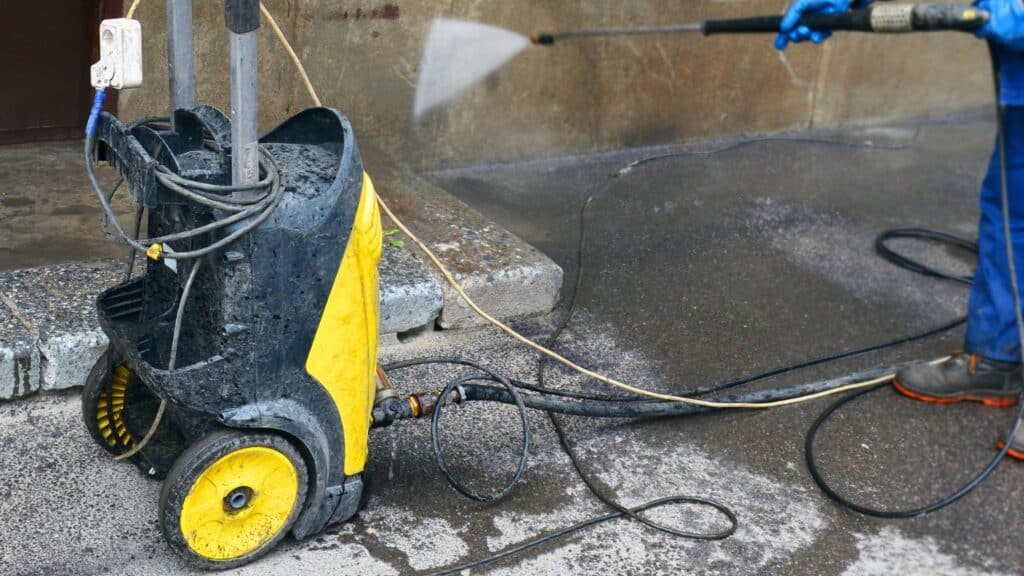
An electric pressure washer, like gas-powered washers, performs similar functions — uses an electric motor pump to amplify and change water pressure. The electric motor is powered by the current from a wall outlet or batteries.
Usually, electric-powered washers pack about 1,200 to 2,000 PSI and have a flow rate of one to two Gallons Per Minute, making them excellent for home use. They are also eco-friendly, operate silently, and require low maintenance.
The major downside of electric-powered washers is that the area most of them can power wash is hinged on the availability of power outlets. While there are battery-powered pressure washers, thus offering better mobility and flexibility, they aren’t always as powerful as the corded units.
Gas Pressure Washers
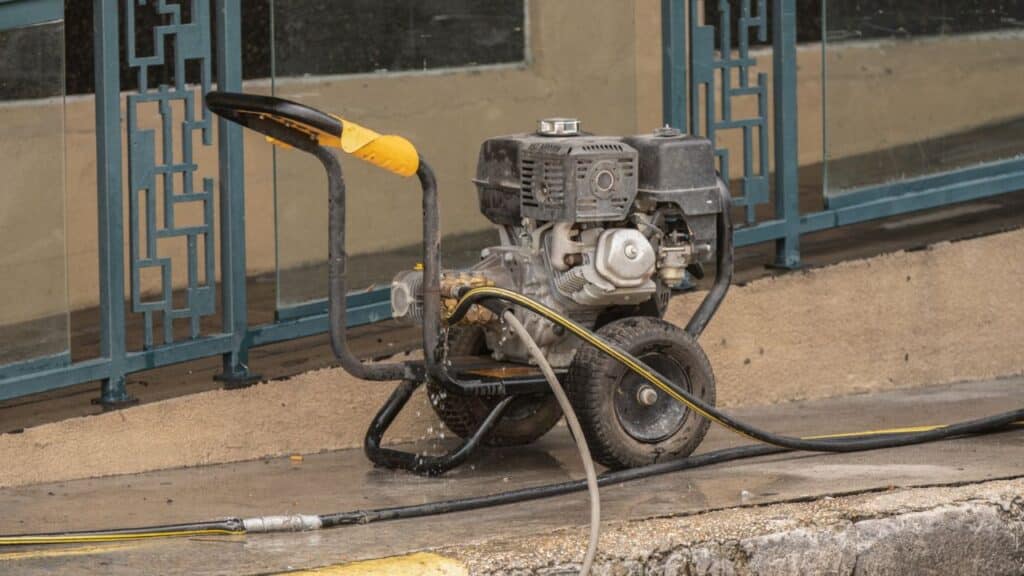
Gas-pressure washers are much more powerful, making them better suited for commercial and heavy-duty applications. Unlike electric models, they have better mobility since they rely on gas and aren’t tied to a wall socket.
However, gas-powered pressure washers have some drawbacks. They are usually heavier, operate loudly, and are more expensive than electric models. Also, their cost of ownership isn’t cheap as they have strict routine maintenance.
| Electric Pressure Washer | Gas Pressure Washer |
| Powered by an electric motor | Powered by a gas engine |
| Best suited for light-duty and home use | Extremely powerful, making them suitable for heavy-duty and commercial use |
| Quiet operation and eco-friendly | Loud operation and pollute the environment with gas fumes |
| Portable and easy to transport | Heavy but often have wheels for transportation |
| Less mobile as they are often connected to power outlets | Have better mobility since they aren’t tethered to wall sockets |
| Requires less maintenance | Strict routine maintenance |
| Budget-friendly | Fairly expensive |
To be fair, both units can be used for most general cleaning tasks in the home. But gas washers are better suited for blasting through stubborn stains and heavy-duty applications.
On the contrary, an electric pressure washer is an excellent choice for car washing and detailing, cleaning outdoor furniture, grills, or other light-duty cleaning projects.
6 Things to Consider Before Buying an Electric Pressure Washer
Picking a suitable electric pressure washer to suit your need from the slew of products on the market can be a bit confusing. There is no need to worry, as we’ll explain six important factors to consider when buying an electric pressure washer:
1. Cleaning Project
The first factor to consider before buying an electric pressure washer is the type of stains and cleaning you intend to use the pressure washer for. This answer gives a better insight into the amount of cleaning power you need.
For general home cleanings, like removing dirt and grime from patio furniture, vehicles, decks, or other surfaces, then a regular electric pressure washer is all you need. However, you will be better off with a gas-pressure washer if you intend to use the washer for commercial or heavy-duty cleaning. A hot water pressure washer is best suited for oil and grease stains.
2. Power
The next factor to consider after determining the stains you intend to clean is the capacity of the pressure washer. The pressure washer’s capacity (cleaning power) is expressed in Pounds Per Square Inch and Gallons Per Minute, or Cleaning Units.
- The Pound per Square Inch, often called PSI, measures the amount of cleaning pressure the pressure washer produces. The pressure provides the stripping force the machine uses to eliminate dirt and stains from surfaces.
- On the other hand, the GPM, or Gallon Per Minute, measures how many gallons a pump moves in a minute. The number of gallons released every minute determines how fast the pressure washer rinse off substances when cleaning.
An easier way of deriving the unit’s cleaning power is to check for the cleaning unit (CU). The cleaning unit represents the time a pressure washer will take to clean a surface. While most pressure washers don’t have one written on them, multiplying the PSI by the GPM gives the cleaning unit.
The PSI and GPM are equally important when deciding which pressure washer to buy, as they determine the unit’s cleaning power. While the water pressure provides the stripping force, the flow rinses off the dirt from the surface. Alternatively, you can check for the cleaning unit (CU) to ascertain the cleaning power.
3. Power Source
An electric pressure washer uses either a power cord or a battery. You should know that while corded units have more power than cordless battery units, they are usually restrictive because they are connected to a wall outlet. However, cordless units offer more flexibility but don’t usually pack enough punch.
And depending on your preference, you may want to factor in the length of the power cord or the run and recharge time of the battery-powered unit to decide which works best for you.
4. Accessories
You also want to check that the type of accessories — nozzles, wand, and hose — included in the pressure washer fits your need.
Nozzles
Pressure washers usually come with either interchangeable nozzles or an all-in-one adjustable wand tip. Although adjustable wand tips are quite convenient, many pressure washers come with interchangeable nozzles because they spray at specific angles. These angles range from 0-degree to a wider 65-degree angle.
The 0-degree (red nozzle) tip delivers maximum blast, making it useful for removing stubborn rust stains on concrete or cutting roots from cracks. However, you must be very careful with this tip, as directing the water pressure in the wrong direction could cause unwanted damage.
The 15-degree (yellow) nozzle has medium stripping force and is great at removing tough mud and dirt. The 25-degree (green) tip can be used for general cleaning, while the 40-degree (white nozzle) tips were designed for car cleaning.
You want to check that the power washer has the type of nozzle you need for your cleaning tasks.
Wand and Hose
The electric motor pushes the pressurised water through the hose and then off the wand. You should know that if the hose curls up when in use, it affects the water flow and pressure. Also, the quality of the wand could affect its longevity.
Thus, you want to check the length and quality of the hose — does it twist or tangle up when in use? You also want to check the quality of the wand and what sort of trigger mechanism it has.
5. Convenience
Another factor to consider when buying an electric pressure washer is the ease of use. The average electric pressure washer can handle most light to medium-duty cleaning projects, but you want to ensure that it also offers convenience.
- Does the unit have wheels for seamless movement around the job site and transportation if it isn’t lightweight?
- Does it have onboard storage for all included accessories, such as the hose, wand, and nozzles?
But you can’t always have it all. Electric-powered washers are known to have some limitations. They aren’t suitable for commercial or heavy-duty cleaning. Most of them also run using a power cable, limiting the range you can cover when cleaning.
While you can improve the reach by using an extension cord, most manufacturers don’t recommend using them. An extension cord can drastically shorten the life of your electric motor. If you must use one, ensure it is a 12-gauge extension cord.
6. Warranty
Once you’ve researched and decided on a product, it is time to read the manufacturer’s fine print to check for the type of warranty offered.
Is the manufacturer guaranteeing the product? What does the warranty cover? Are they willing to repair or replace a defective or broken unit if you end up with one within the window of time after purchase? You need to make all these findings to confirm that you are covered before spending on any product.
FAQs
How do I choose a good electric pressure washer?
Before choosing an electric pressure washer, you want to check that the washer is right for you. To check this, you need to consider the following factors:
- Cleaning project
- Cleaning unit
- Power source
- Accessories
- Convenience
- Warranty
Should I get an electric or gas-powered pressure washer?
As we’ve mentioned earlier, it all depends on individual needs. While electric pressure washers may seem the better option, it is not suitable for all cleaning projects. You have to determine what type of cleaning you intend to use it for and how often you will use it to know which one is best for you.
Electric washers produce around 800 to 1,800 PSI, making them perfect for cleaning delicate surfaces without fear of pressure damage. On the other hand, gas-pressure washers are best suited for heavy-duty jobs due to their higher pressure, which is often upward of 2,000 PSI.
Are pressure washers worth it for cars?
Yes, they are. Pressure washers are much more efficient and eliminate dirt and grime faster than hand washing. They also use considerably less water than a hosepipe.
Also, the best electric pressure washer for cars are electric-powered washers because they have lower pressure than gas models and won’t ruin the car’s paint. You also want to start with low pressure when pressure washing vehicles and only increase it if needed.
Which PSI range is best for cars?
While pressure washers help reduce the stress of washing vehicles by hand, you can damage your paint if you don’t do it right. Staying between a PSi range of 1200 to 1900 and a flow rate of 1.1 to 1.6 Gallon Per Minute when pressure washing vehicles is what we recommend.
Exceeding this range increases the chances of ruining your paint job. You should also use the white nozzle designed for vehicles whenever you are washing cars.
What kind of pressure washer do I need to clean my car?
A light or medium-duty power washer is the most suitable pressure washer for the job. And most electric pressure washers fall within these categories. While it is important to buy a good pressure washer, it is equally important that you use the correct nozzles and stay at a safe distance (3-5 feet) away from your car.
Is 3000 PSI too much for a car?
Yes, it is. Anything above 1,900 PSI is too much for cars and can easily damage your car’s paint job. However, before turning on a pressure washer, you need to relieve any built-up pressure within the pump.
Start by turning on your water source, then depress the wand trigger to push out any water or air from the unit. You can now proceed to fire up the system once you have water flowing out of the unit.
Are electric-powered washers good for car detailing?
Definitely! Electric-powered washers are great for regular and intensive car cleaning. An electric power washer has lower pressure than other pressure washers, offers much more flexibility, and easily removes built-up dirt without risk of damage.
Final Thoughts
Electric pressure washers clean surfaces much quicker using less water and are the best pressure washers for cars, as their low-pressure levels eliminate the risk of paint damage.
However, regardless of whichever pressure washer you eventually settle for — gas or electric — you should always start with low pressure when washing vehicles and only increase the pressure when necessary.
You also want to avoid spraying at a single spot for prolonged periods and keep a safe distance (3-5 feet) from the car to avoid ruining the paint job.
I recommend Karcher’s K5 Premium electric pressure washer because it is the best.


